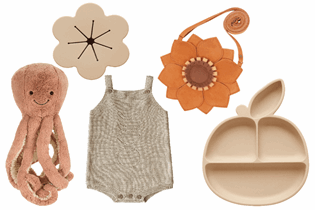Budgeting tips for reducing your food costs

With the rising cost of living, the weekly grocery bill can be hard to swallow. Jenny Douglas from Jumpstart Nutrition shares her tips for keeping the cost of food under control.
Heading to the supermarket for just a few items seems to cost more and more, and most families' weekly grocery bill has increased by around $50-100 each week. Stats NZ have found the price of food has increased by 6.2% between June 2021 and June 2022 compared to an increase of around 4% the year before; and shipping issues across NZ for basic items are also causing a strain on everyone's pockets. When you start a family there is already pressure on finances, especially when one parent may be on maternity leave, plus there’s an extra mouth to feed of course. Here are my top tips on not breaking the bank at the supermarket…
PORTION YOUR FOOD
Over the generations our portion sizes have increased alongside the increase in plate sizes that you buy. Keeping portions of food to what is needed for healthy living can not only help reduce your food bill, but also help maintain a healthy weight. As a general guide for every member in the family, you should portion a palm size of protein (eg meat, chicken, egg, lentils, or around 50 g meat for kids and around 100-150 g for adults), a fist size of carbohydrates (eg potato, rice, pasta) and 1-2 fist sizes of non-starchy vegetables (eg broccoli, carrot, spinach, tomato). This is the ‘starting’ portion for the family and if your child (or you) is still hungry, then yes of course they can have some more, but when we keep portions measured there is less wastage. This means that any food you haven’t portioned on to the plate can be reused for another meal.
COOK AT HOME
The more you cook at home the more you save, but sometimes this can be a challenge when you are time-poor as a parent, so it’s good to look at where some higher-cost products come from. For example, granola from the supermarket can cost around $7-12 per box but making homemade granola can reduce that in half and it only takes 10-15mins to make. Prioritise where costs can be cut and accept there are some that cannot change.
If you're a family who orders takeaways or eats out regularly, you might want to think about what drives this. Are you stuck for time? Are you tired at the end of the day and can’t be bothered cooking? Is there no food in the cupboard? These questions all have different strategies for dealing with them, but one of the easiest things you can do on the nights you do cook is to make extra. Bulk cooking mince dishes, curries, and pasta dishes and freezing portions into takeaway containers is a great way to reduce takeaway nights but allow ‘nights off’ for when you are tired or come home late.
Cooking from home helps your baby start to learn the family flavours and this is likely to lead to better acceptance of family meals in the long term. Making a family dinner that can be altered slightly (eg add the salt after taking out baby's portion) for baby is the most cost-effective way to feed them rather than purchasing commercial pouches or baby food jars. Home cooked foods are also far superior in quality as many pouch/jar foods have only very small amounts of iron foods such as meat, fish, or chicken and are often made sweet with additional fruits added to the savoury mixes. Reusable pouches are available to store home-cooked purees in so that you can take homemade foods out and about.
REDUCE WASTE
Reducing food waste will help reduce your food bill but also helps reduce your impact on the environment. One of the biggest solutions for reducing food waste is meal planning and deciding before you go shopping what meals you are going to cook. This means you can shop only for the ingredients you need to make certain meals.
Reducing food wastage can be very challenging with children who inherently eat one bite of some food and then won’t eat the rest. If this is the case in your family, just plate up very small amounts of new foods that haven’t been tried before and then offer seconds if it is successful. Remember that leftovers can be used for another meal or turned into something new, for example roast veggies made into an omelette.
When cooking, think about using every part of the vegetable, for example:
+ Use the stalk of the broccoli and grate this into mince dishes or cut into cubes to add to curry/stew
+ Use the green leaves of leek to add into soups or curries
+ Keep the skins of baked potatoes and recook these to make crispy skins for another meal that could be used as nacho chips or as a snack with hummus/dips
+ Use all parts of the coriander as the stalks can still be added through curries or salads
+ Use veggie scraps, eg peelings and stalks, for making soups or stocks
There is nothing worse than going to use a cucumber or other vegetable only to find that it is mouldy or soggy, so thinking about how you store your food can help them last longer. Some foods last longer when stored in the fridge and some store longer when kept in a dark, cool cupboard. Vegetables often hate being left in cling film or plastic bags, so put them into a vegetable draw or store with a paper towel in a plastic container to maintain freshness. Lettuce and other leafy greens do well when stored with some of their roots kept in water. For some great tips on storing foods and reducing waste, head to lovefoodhatewaste.co.nz.
BE A SMART SHOPPER
Part of being a smart shopper is first knowing what you are spending now on food. Keep your food, restaurant, café and takeaway receipts for a few weeks and look at the amount you are spending over the week for all food items. This gives you a starting point for knowing exactly how much you are currently spending. From here you can start to think about how much you would prefer to spend, and chat with your family about how that could be achieved.
At the supermarket there are several steps to reducing your bill:
+ Take a list
+ Limit the number of times you head to the supermarket to help reduce the number of ‘extras’ that get added into the basket
+ Don’t go to the supermarket when you're hungry
+ Online shopping is a useful way of sticking to your budget as you can remove items at the checkout if the food bill is too high
+ Ideally head to the supermarket without kids as kids are likely to encourage you to add to the trolley as you walk around
+ If you need to take your baby to the supermarket, then time your trip for just after a nap and feed, so they are well rested and happy while you go around the store
+ Look at the cost per unit when comparing products to ensure you are getting value for money
+ Buy foods that are in season and are in plentiful supply. It’s a good idea to know what foods are available at certain times of the year. There is good information about what vegetables are in plentiful supply at vegetables.co.nz. Your local food market will also sell foods that are in season and reasonably priced.
+ Consider shopping around to look out for specials, this can be done by looking over specials on advertising mail or looking online to compare prices. Sometimes fruit and vegetables are great value at farmers markets or food co-ops, and these are often better value than the supermarket.
+ Buying in bulk, especially for staple foods such as rice, pasta, oats, flour, tea, cereals, etc is often cheaper as there is no pretty packaging. You may consider sharing bulk buying with friends or family members.
+ Meat can often be cheaper when buying in larger portions too and this can be split into meal portions and frozen. Cheaper cuts of meat can be made delicious by using slow cookers and this can also be helpful as slow cooking over the day helps keep your hands free to look after baby and also means the meal is ready to eat just as ‘witching hour’ starts for baby.

USE YOUR FREEZER
The freezer is your friend when it comes to managing food supply within your home. Frozen vegetables are just as nutritious as fresh and at certain times of the year it is cheaper to buy the frozen version. Another tip is if your child has eaten just a bite out of their banana or apple, then cut that bite off and dice up the rest of the fruit and place in the freezer to be reused in baking or in a smoothie.
Bread should be stored in the fridge or freezer over the warmer months to avoid mould. Keeping bread that is pre-sliced in the freezer can be a great option for smaller families who do not use much bread over the week.
Small leftovers from an evening meal can be frozen and sent to daycare or kindy as an easy lunch that can be reheated for your baby or toddler. If you buy foods that are near expiry, then the freezer can give you extra time to use it when you are ready to cook it.
COOK A FEW VEGETARIAN MEALS OVER THE WEEK
Vegetarian proteins such as lentils, chickpeas and beans are a fantastic nutritional source of protein and fibre and have a very cheap price tag. A can of chickpeas will cost you around $.80-$1.00 and can feed a family of four when vegetables and rice/pasta are added. Canned or boiled lentils (especially red ones) are a very easy addition to mince to bulk it up so that there is a good amount of protein but makes the meal stretch further. Eggs are also a fantastic protein source and can be really good value for money. They can be used in a range of dishes, such as fritters, omelettes, baking and frittata and often come in trays that are great value.
GROW YOUR OWN
Having your own vegetable patch or fruit tree can be a wonderful learning experience for children, it also has the advantage of you being able to control some of your food costs.
Growing easy to cultivate fruit and vegetables, such as lettuce, tomato, raspberry, strawberry, pumpkin, along with your own herbs are a great way to feed your family. You don’t need a huge garden to achieve this, and lettuce and tomatoes are often happily grown in a sunny part of your house.
Having chickens in your garden to provide eggs or having your own livestock can also help reduce your food bills, and again teach your kids about how food systems work, and that meat does not come on a plastic tray.
REDUCE THE EXTRAS
Treat foods, such as biscuits, chocolate, chips, fizzy drinks and alcohol greatly increase the food bill and give no nutritional value to your shopping trolley. To help reduce the extras, but still feel like you are having something special try some simple switch-outs:
+ Make your own sparkling water and add fruit to give it flavour instead of buying fizzy drink
+ Try frozen berries for those night-time sweet cravings, or fresh fruit with yoghurt
+ Batch-bake some oat cookies that can be frozen and defrosted as needed
With a little know-how and some small changes to your weekly routine you can save a considerable amount on your weekly grocery bill without necessarily feeling like you are going without. Hopefully these tips will help you and your family to get the most out of your meals and take some of the pressure off in these current times when things can feel tight.

AS FEATURED IN ISSUE 59 OF OHbaby! MAGAZINE. CHECK OUT OTHER ARTICLES IN THIS ISSUE BELOW

















